
Nine startups with promise
These ventures are making the right noises
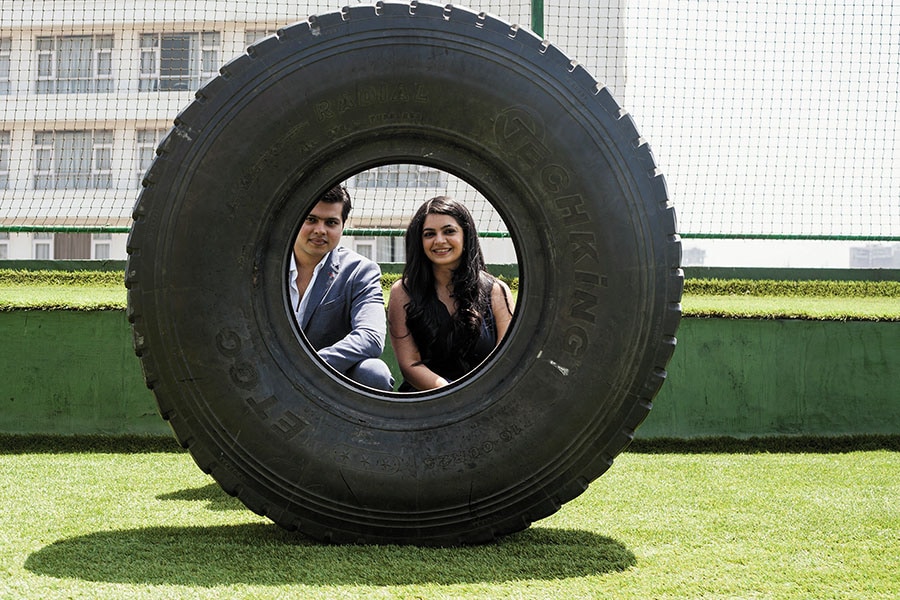 Neha Motwani and Jayam Vora, founders, Fitternity
Neha Motwani and Jayam Vora, founders, FitternityImage: Aditi Tailang, Location courtesy: Reset Bandra west
For nearly two decades, India has been at the forefront of a startup revolution. From Zomato and Flipkart to Ola, startups in Asia's third-largest economy have been flush with funds and are busy building billion-dollar empires. As investors continue to flock the Indian startup sector, there seems to be no dearth of innovations taking root in the country. From a drone maker who sells UAVs to the Indian defence sector to a self-driving truck maker and a peer-to-peer lender who is taking on banks, Forbes India looks at nine startups that have the potential to emerge as game changers in the coming years.
9 The number of homegrown unicorn startups valued at more than $1 billion. These are Flipkart, Paytm, Ola, InMobi, Quikr, Hike, Zomato, ReNew Power and Shopclues
Name: Fitternity
Founder: Neha Motwani and Jayam Vora
Headquarters: Mumbai
Revenue: Undisclosed
Funding: $3 million
Fitternity: Making India fit
Fitternity follows one simple mantra. The company wants more Indians to workout and explore various forms of exercise. Already, over 280,000 people use the Fitternity app, an online hyperlocal discovery and booking platform for fitness programmes, including gyms, yoga, Zumba, marathons, and cross fit. The company was founded by Neha Motwani, 32, a former consultant with Aon Hewitt, and Jayam Vora, 28, a health care executive.
“Every 33 seconds an Indian dies of a heart attack,” says Motwani. “There are 20 million obese women in India, more than double that of men. What we need is preventive health care and Fitternity is trying to do that.”
The company ties up with gyms and other fitness studios to bring them under one roof. That helps users decide on the best option available to them within their proximity and try out new fitness methods. “Our own assessment is that nearly 7 million people in the country workout. That’s a hugely underpenetrated market,” says Motwani. “We believe there are at least 20 million people wanting to workout.”
So now, in an attempt to make fitness more accessible, the company has begun offering schemes that allow members to test out studios before taking a call on their membership. “Six out of 10 users don't end up starting a workout or buying a membership because of the fear of not using it. To combat this, we allow membership portability and make usage on pro-rata basis,” says Motwani.
The company charges a commission from the service providers and customers on the transaction and currently manages over $5 million transactions a year.
Along the way, it has managed to raise $3 million from investors. It has about 12,000 listings across seven cities offering 17 fitness forms.
“When we started out, we did not have a model to follow,” says Motwani. “We had to build the product from scratch as the Indian model is different from the models in the West, which are more mature markets as far as fitness goes. For now, we are just getting started.”
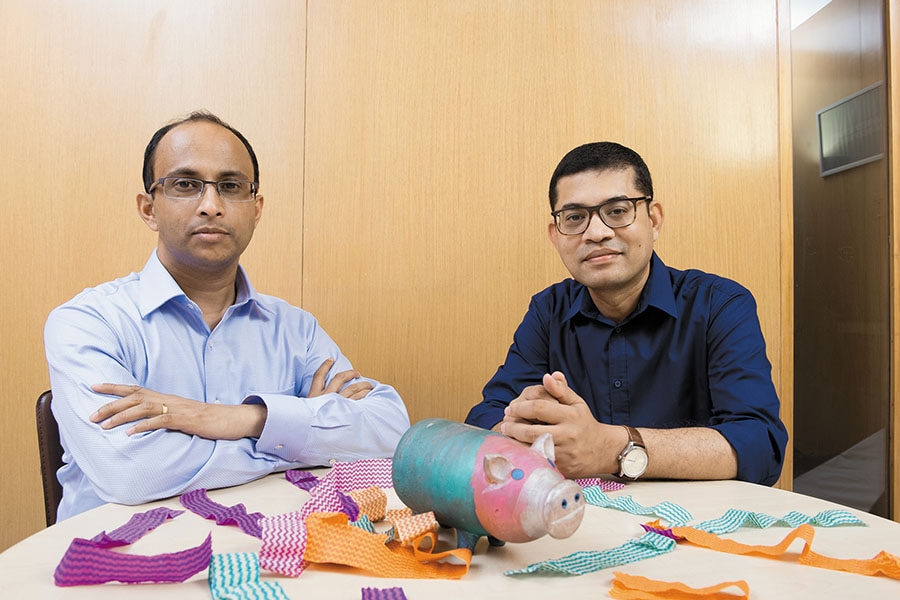
Name: Bargain Technologies Pvt Ltd
(Brand name: Vantage Circle)
Founder: Anjan Pathak and Partha Neog (right)
Headquarters: New Delhi
Revenue: ₹4.3 crore
Funding: ₹1.4 crore
Vantage Circle: The rewards platform
Vantage Circle is a rather peculiar company. With 90 percent of its workforce based out of the scenic river town of Guwahati, the seven-year-old startup has kept its operations away from India's usual startup hubs of Bengaluru, Mumbai and Delhi.
Founded in 2011, Vantage Circle provides an employee rewards and benefits platform. The company connects brands with companies to offer services such as discounts for dining, holidays, insurance, utilities and wellness.
Vantage Circle earns its revenues after the two parties strike a deal. It also offers an array of services on its platform that include allowing employees to compliment each other, recognise their work and letting employers reward performers.
The company’s customers include eight of India’s top ten IT companies and others, including Deloitte and JP Morgan. Last year, Vantage Circle raked in revenues worth ₹4.3 crore with profits of ₹30 lakh. The company currently has over 6 lakh users.
“We started in 2011 when Snapdeal and Groupon were around offering discounted coupons,” says Partha Neog, 43, CEO, Vantage Circle. “We knew there was something for us. But we had to find a niche area."
Soon, it began pitching the idea to companies to offer exclusive offers on a single platform.
By 2015, the company forayed into the employee rewards and recognition space.
“This market is maturing and constantly evolving,” says Neog. “Employees would like to be recognised and rewarded for their work. That’s where we come in. Vantage Circle is already profitable and has not raised any venture capital funds so far. It raised a seed round of ₹1.4 crore while the rest has come from the founders.
Now, the company plans to offer its services globally. As a prelude to international operations, it is working with Indian companies operating in those geographies.
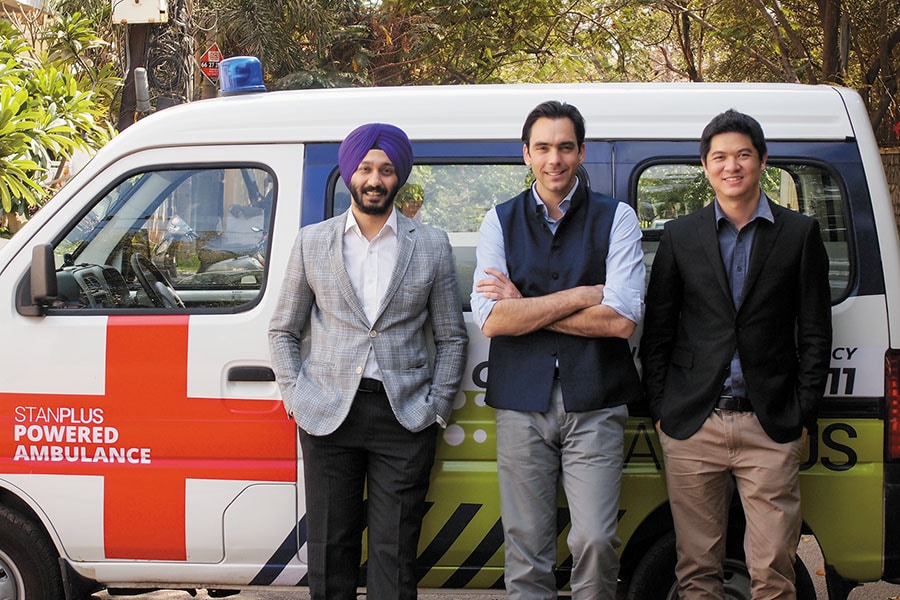
Name: StanPlus Technologies Private Limited
Founder: Prabhdeep Singh, Antoine Poirson (centre) and Jose Leon (right)
Headquarters: Hyderabad
Revenue: Undisclosed
Funding: $1.1 million
StanPlus: Uber for ambulances
Operating out of Andhra Pradesh and Telangana, two-year-old StanPlus is the brainchild of three Insead graduates. It provides ambulances for those in distress within 15 minutes of a request; the vehicles are fitted with advanced and basic life support and cardiac care.
So far, numerous hospitals in the two southern states have outsourced their ambulances to StanPlus. The company also owns and operates its own fleet of over 180 ambulances.
“In India, finding an ambulance is often a herculean task,” says Prabhdeep Singh, 30, the CEO of StanPlus. “One of my co-founders was witness to his colleague dying due to the inadequacies of the ambulance that was carrying him. That’s how we came up with the idea.”
After graduating from Insead in 2016, Prabhdeep Singh, Antoine Poirson and Jose Leon decided to set base in Hyderabad. Today, they operate in other cities, including Vijayawada, Tirupati and Vishakhapatnam. Over the next year, StanPlus has firmed up plans to begin operations in Bengaluru and Chennai before moving pan-India in the next five years.
“We want to use technology to bring ambulances closer to people and be able to perform any complicated transport,” says Singh. Currently, the company follows a model similar to Uber and Ola while deciding on placing an ambulance. “We follow historical data on areas from where we have demand, and then keep ambulances ready there. That way, we can service a request within 15 minutes,” says Singh.
Operating an ambulance costs almost 15 times more than a cab per kilometre, and StanPlus is now working with insurance companies to cover that cost. “Even as we scale up, we want to ensure that we continue to keep patients at the heart of our business. That’s the only way we can succeed,” says Singh.
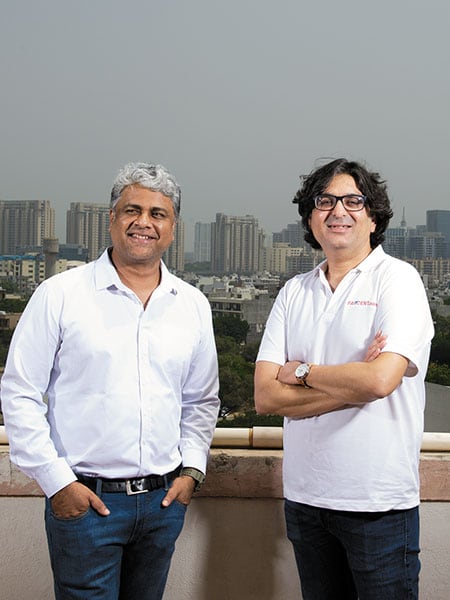 Image: Amit Verma
Image: Amit VermaName: Faircent
Founder: Vinay Mathews (left), Rajat Gandhi, and Nitin Gupta (not in picture)
Headquarters: Gurugram
Revenue: Undisclosed
Funding: $9.8 million
Faircent: Banking on peers
Faircent has much to thank legendary motorcycle maker Royal Enfield. After all, since starting out in 2014, the Gurugram-headquartered peer-to-peer lender is today India’s largest such operator and disburses loans of over ₹3 crore every month.
Rajat Gandhi, 45, the CEO of Faircent, credits the beginnings of his company to a former colleague’s wish to buy a Royal Enfield. “I had a colleague who said he was buying a Royal Enfield bike,” Gandhi tells Forbes India. “His mother gave him ₹30,000 and he was looking to crowdfund the remaining amount. He posted his request on Facebook and managed to raise the remaining ₹30,000. That’s when it occurred to us that peer-to-peer lending is a possibility and we began to explore the idea seriously.”
Peer-to-peer lending is a form of crowdfunding where an online platform brings individual borrowers and lenders together to raise or lend unsecured loans without a middleman. The rate of interest and the tenure of the loan are decided by the platform, based on a thorough analysis of the borrower's profile.
Faircent began operations in 2015 and follows a model similar to banks. The borrower signs up on the platform and makes a request for the loan. “The loan isn’t provided by one person. It’s pooled from various lenders,” says Gandhi. “Here, an individual is competing with a bank to get a borrower. We assign a score on the borrower based on his ability and intention to repay.”
Faircent charges a commission for providing the service. The borrowers are charged 2.5 percent while the lenders are charged 1 percent on transactions. In return, it analyses the profile of the borrower based on his CIBIL score and provides a risk rating.
Currently, the company has a restriction of ₹10 lakh per individual and Gandhi is pinning on the Reserve Bank of India to come out with a clear policy on peer-to-peer lending. “The model has huge potential to disrupt existing systems,” he says.

Name: Flux Auto
Founder: Pranav Manpuria & Abhishek Gupta (right)
Headquarters: Bengaluru
Revenue: Undisclosed
Funding: Bootstrapped
Flux Auto: Driving change
Flux auto is gearing up to change the way trucks are driven on India’s messy and chaotic roads. Founded by Pranav Manpuria, 23, and Abhiskek Gupta, 23, the company wants to bring in self-driving technology to trucks in India. Over the next few months, it will begin testing 75 of its pilot vehicles on Indian roads.
“We felt that the commercial viability of self-driving technology can be best [tested] in trucks,” says Manpuria, CEO of Flux Auto. “Nobody had gone into the market with the technology so far.”
While global auto majors, including Volvo, Daimler and Tesla, are building autonomous trucks, Manpuria believes that Flux Auto’s technology only costs a fraction of what it costs the others. It also has another advantage. The technology that Flux Auto offers can be retrofitted to a truck and costs about $4,000.
“Globally, the technology that is in use is LIDAR (Light Detection and Ranging),” says Manpuria. “We are using vision sensors which do the same job at a much cheaper rate.” He reckons that the use of LIDAR costs anywhere close to $100,000.
So far, the two-year-old, Bengaluru-based company has been bootstrapped. However, over the next few months, it plans to raise series A funding as it looks to expand operations across the country.
“We have received a lot of interest from fleet owners and companies,” says Manpuria. “We are currently focusing on Level 3 autonomy, which needs a driver’s presence in the vehicle. However, for us to move to Level 4 and Level 5 is quite easy as it simply needs a software update.” Level 5 doesn’t need a human driver or a steering wheel.
“For now, we want to make sure that our vehicles are safe and accident-free,” says Manpuria.
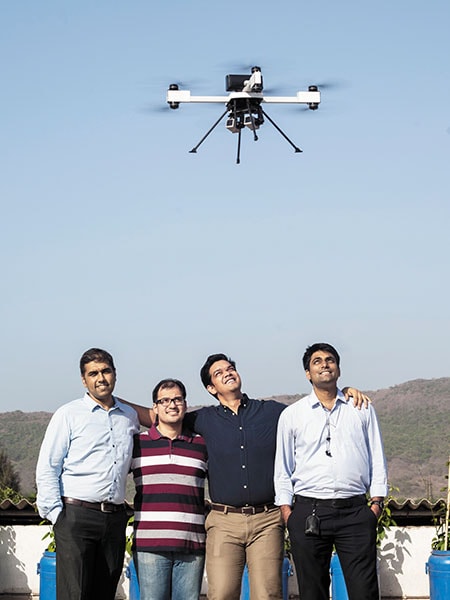 Image: Aditi Tailang
Image: Aditi TailangName: ideaForge Technology Pvt Ltd
Founders: (Left to right) Vipul Joshi, Ashish Bhat, Rahul Singh and Ankit Mehta
Headquarters: Navi Mumbai
Revenue: Undisclosed
Funding: $13 million
ideaForge: Eye in the sky
For a decade now, ideaforge has been quietly securing India’s vast hinterland. From helping the Indian Army spot survivors in the submerged areas of Uttarakhand and carrying out anti-terror operations at Pathankot, Pampore and Sunjuwan to detecting Naxals digging roads to burying landmines, the company manufactures unmanned aerial vehicles (UAV) used by the Indian armed forces.
ideaForge started in 2007 as an alternative energy company working on making hand-cranked charging solutions for portable electronics.
“The pivot to making unmanned systems has its origins in the work we did in IIT-Bombay as undergrads,” says Ankit Mehta, 35, the CEO of ideaForge. “We independently came up with the concept of a quad-rotor and built the first prototype in 2004. The whole exploration started when one of us wanted to build a hovercraft to make it float on the Powai lake.”
In 2009, the company built what it claims was then the world's lightest and smallest autopilot for DRDO labs for its UAV programmes and also launched India's first fully autonomous Micro UAV. Since then, there has been no looking back.
Today, ideaForge manufactures UAVs and sell them to government and enterprise customers. So far, the company has delivered over 100 UAVs to the Indian defence, central armed, and state police forces. ideaForge’s UAVs are also used for agricultural applications such as for solar plant inspections, stockpile measurements, mapping and crop health monitoring.
“Our products are delivered at the best value, which makes us a market leader in our country and we are poised for exports,” says Mehta.
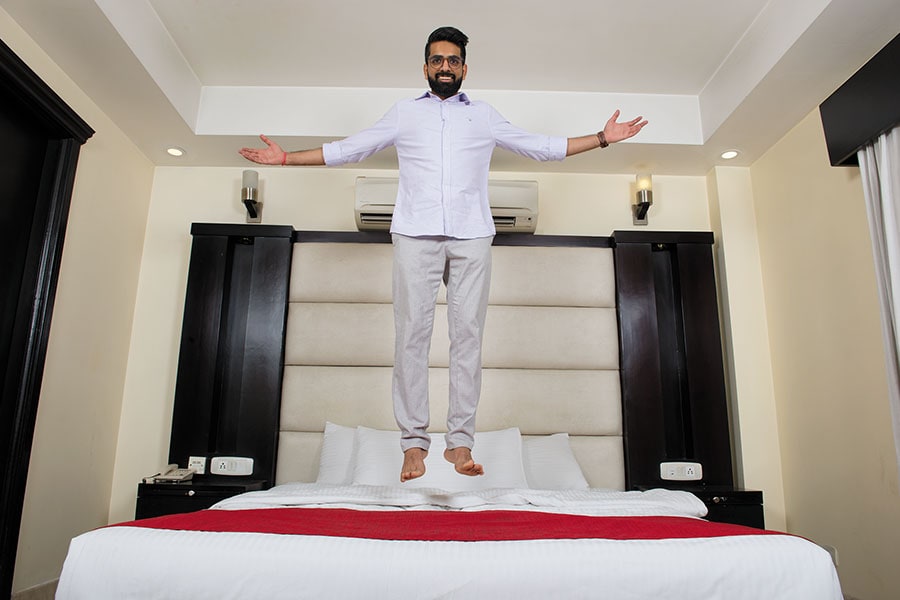 Image: Amit Verma
Image: Amit Verma Name: StayUncle
Founders: Sanchit Sethi (in picture) and Blaze Arizanov
Headquarters: New Delhi
Revenue: Undisclosed
Funding: $30,000
StayUncle: A safe haven
Stayuncle lives by one motto: Help unmarried couples in India find rooms. The four-year-old startup founded by Sanchit Sethi and Blaze Arizanov ties up with hotels across the country where unmarried couples can rent rooms for as short as 8-10 hours. The idea is to help them find safe and affordable rooms.
Set up in 2015, the company today has over 900 properties across 35 cities in the country. The company received its first angel investment from Ajay Naqvi, the former country marketing manager for Airbnb.
“When we started out, there was not a single hotel in the country giving rooms to couples on an hourly basis,” says Sanchit Sethi, 29, CEO of StayUncle. The company started with two employees and has today ramped it up to 12. It also offers hotels for 24-hour stays, but Sethi says nearly 85 percent of his clients still use the service for short stays.
“What we believe has been our success is that we have managed to change the mindset of hoteliers,” says Sethi. StayUncle staff visit hotels to ensure that the staff doesn’t discriminate against unmarried couples.
Oyo Rooms, one of India’s largest budget hotel providers, also began offering couple-friendly rooms, but Sethi believes StayUncle’s first-mover advantage has helped it in building a steady clientele. The company has already helped over 50,000 customers, according to Sethi. Over the next few months, it wants to roll out Love Hotels, a short-stay hotel for the purpose of allowing guests privacy for sexual activities.
“We now also want to own hotels that are couple friendly and completely renovate them to our liking,” says Sethi. “The immediate focus is on Love Hotels.”
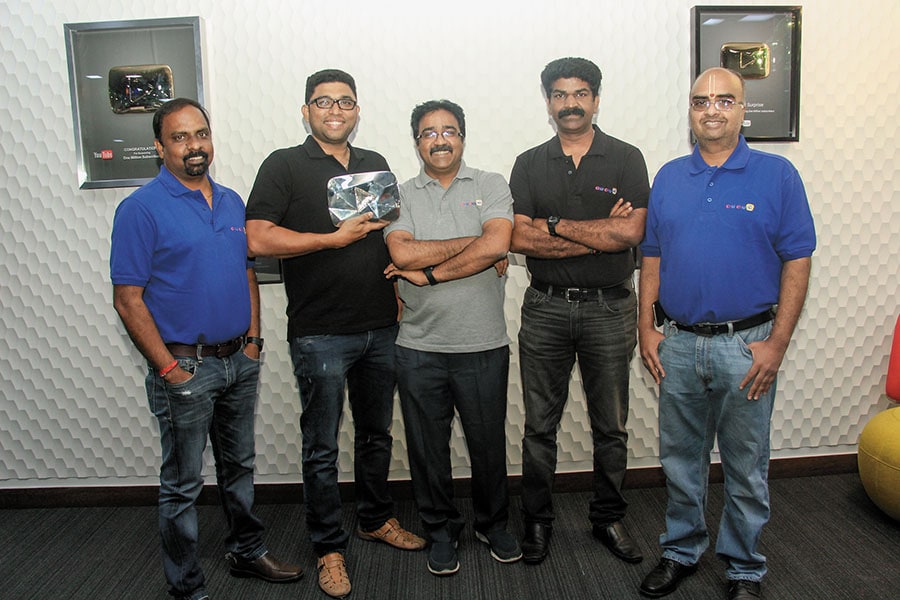
Name: ChuChu TV Media Networks Private Limited
Founders: (Left to right) Suresh Bhoopathy, Vinoth Chandar, BM Krishnan, Ajith Togo and Subbiramanian TS
Headquarters: Chennai
Revenue: Undisclosed
Funding: Bootstrapped
ChuChu Studios: Animated future
It all started with a father's love for his daughter. Vinoth Chandar, the CEO of Chennai-based kids’ animation ChuChu Studios, wanted to amuse his three-year-old daughter, Harshita, fondly known as ChuChu.
The 39-year-old would draw her and fit her into various animated characters, and bring her to life on screen. The first of such videos, ‘Chubby Cheek’ garnered rave reviews on YouTube and within two weeks of upload, went viral, attracting over 300,000 views. Soon, the computer science graduate began uploading more animated videos on YouTube.
In February 2013, Chandar along with four other friends established ChuChu TV, a company that creates animated videos of rhymes and original songs that are uploaded to YouTube.
Today, ChuChuTV is one of the world's biggest media brands for children and the largest in India and the Asia-Pacific region by volumes. ChuChu TV's network of nine channels has over 24 million subscribers from countries including the US, India, the Philippines, Canada, and Vietnam. One of its videos, an animated rendition of ‘Johny Johny Yes Papa’ alone has over 1.4 billion views. The company is also the third largest viewed channel on YouTube after music channel T-Series, and Sony Entertainment. The company earns its revenue through a revenue share with YouTube and has recently tied up with Amazon Prime.
“The US continues to be our biggest market followed by India,” says Chandar. “We have a Spanish and a Portuguese channel too and have launched in Tamil which is seeing huge numbers, proving that regional language programming works well.”
Over the next few months, the company is planning a slew of new products, including apparel and toys, to engage with the brand and characters. “We are working on new formats and customisations for addressing new markets like Korea and China,” says Chandar. “We are singularly focussed on bringing joy and learning to pre-schoolers across the world.”
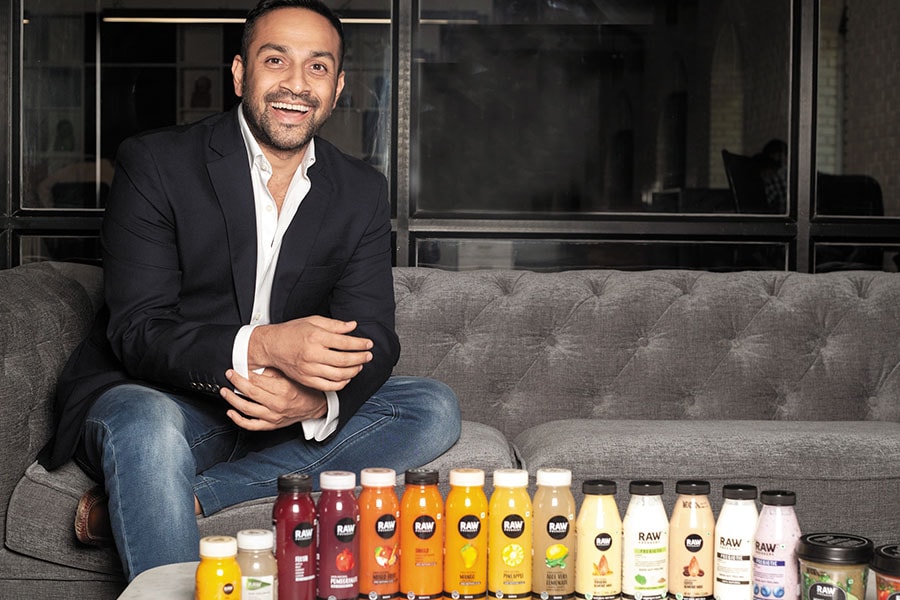 Image: Aditi Tailang
Image: Aditi Tailang Name: Rakyan Beverages Pvt Ltd (Brand name: Raw Pressery)
Founder: Anuj Rakyan
Headquarters: Mumbai
Revenue: Undisclosed
Funding: $24 million
Raw Pressery: The healthy route
Anuj Rakyan has been a fitness freak ever since he remembers. So when the 37-year-old former investment banker decided he had had enough of consuming preservative-laden juices, Rakyan began making his own juices in his kitchen. That was four years ago. Today, his company, Raw Pressery, sells everything from cold-pressed juices, smoothies, soups and nut-milk. “What sets us apart is that we don’t use any water or sugar in our product,” says Rakyan. “They are all farmed fresh and we do our own supply chain management to ensure that the product is fresh when it reaches the consumer.”
The company uses the acclaimed high-pressure processing (HPP) technology which ensures fresher and safer food products with better shelf life. Raw Pressery’s portfolio includes over 30 different blends of fresh juices which include raw juices and smoothies that are a blend of various fruits and vegetables. It also offers a subscription model where consumers can pay for a month of supplies that will be delivered to their doorstep.
Raw Pressery began operations in 2013 and relied heavily on word of mouth to sell its products. The growth has been rather rapid since then. It sells about 2 million units of cold-pressed juices and smoothies every month across India and has even attracted venture capitalists, including Sequoia Capital. Investors have already pumped in $24 million so far and last year, actor Jacqueline Fernandez too invested in the company.
The company operates a plant in Mumbai from where its products are shipped to cities across the country. Over the past few months, Raw Pressery has begun selling its products in the Middle East too, including in Dubai and Doha. It is soon planning to sell cold-pressed juices in the Southeast Asian markets before foraying into Europe.
(This story appears in the 25 May, 2018 issue of Forbes India. To visit our Archives, click here.)
X















